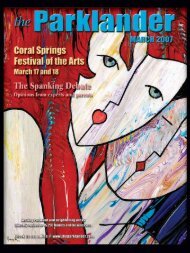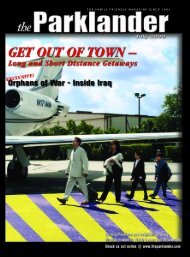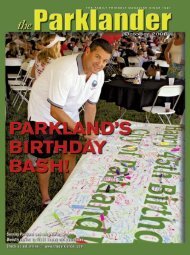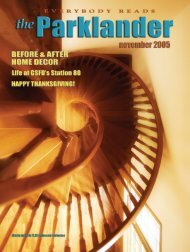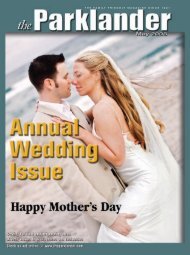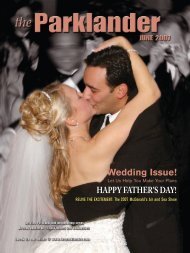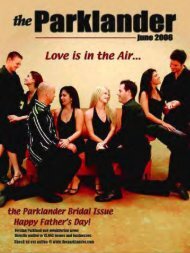September 2008 - The Parklander Magazine
September 2008 - The Parklander Magazine
September 2008 - The Parklander Magazine
Create successful ePaper yourself
Turn your PDF publications into a flip-book with our unique Google optimized e-Paper software.
WATCH YOUR LANGUAGE<br />
<strong>The</strong> Shorter the Better<br />
By Bill Johnson<br />
You will never hear a drowning man yell “Assistance!” You can’t even<br />
imagine that. A drowning man yells “Help!” That illustrates a simple<br />
point: short words are more powerful than long words. Short words are<br />
also more specific than long words, which are often vague.<br />
If you want to communicate effectively, keep in mind that shorter words<br />
are better.<br />
For some reason, many police officers seem to think that longer words or<br />
inflated language equals good communication. Perhaps they think it makes<br />
them sound more intelligent. I recently heard a police spokeswoman on<br />
television say that “the suspect had been shot twice in the lower<br />
extremities.” Why didn’t she say the man was shot in the legs Is “lower<br />
extremities” clearer than “legs”<br />
Another police officer, describing an automobile chase, said, “<strong>The</strong> suspect<br />
drove at a high rate of speed on the surface street.” I was curious about<br />
where else our streets may be located.<br />
A former FBI profiler was on TV while a gunman was holding hostages<br />
and police were blocking off an area of the city. He told us, “This is<br />
an inconvenient time for commuters who are ‘transitioning’ from work<br />
to home.” Do you “transition” from work to home I suspect you just<br />
“go” home.<br />
Police never catch people; they apprehend them. <strong>The</strong>y never see<br />
something; they observe it. Accident victims don’t suffer cuts and bruises;<br />
they suffer contusions and abrasions. Police never fire their guns; they<br />
discharge their firearms. <strong>The</strong>y don’t bring in dogs to search for bad guys;<br />
they bring in canines. <strong>The</strong>y don’t send another police car; they dispatch<br />
one. In the world of law enforcement, it seems bigger words are thought to<br />
be better than shorter ones.<br />
In court testimony, I have never heard a police officer testify, “I saw a man<br />
run out of the building. I chased him down the street and caught him.”<br />
But I have heard scores of police officers say something like, “I observed<br />
the subject make egress from the building. I gave chase and apprehended<br />
the subject.” I wonder if the officer makes egress from his home each<br />
morning to transition to work. A police officer once told me in casual<br />
conversation that a man’s face was beaten to a pulp with a tire iron, but<br />
when I interviewed him for television news with the camera running, he<br />
said, “<strong>The</strong> first thing I observed was a massive hematoma.”<br />
Police are not alone in using big words instead of short ones and using<br />
more words than necessary. “At this point in time,” seems to have replaced<br />
“now” in the vocabulary of many people. Why use five words when you<br />
can use one Does it somehow make you sound smarter<br />
You have heard people talk about inclement weather. What is inclement<br />
weather Why didn’t they say “rain”, “snow”, or whatever <strong>The</strong>y used five<br />
syllables when one would be more specific, better communication. Have<br />
you noticed that there never seems to a “crisis” any more It’s always a<br />
“crisis situation”.<br />
In a wonderful little book by Richard Lederer, called <strong>The</strong> Miracle of<br />
Language, he makes the case for short words by example. He writes,<br />
“Short words are like sparks that glow in the night, prompt like the dawn<br />
that greets the day, sharp like the blade of a knife, hot like salt tears that<br />
scald the cheek, quick like moths that flit from flame to flame, and terse<br />
like the dart and sting of a bee.” Every word is only one syllable. Elsewhere<br />
he points out that the most powerful words in the English language are<br />
short: love, hate, sex, fear, grief, etc.<br />
Of course, there are exceptions to every rule. <strong>The</strong>re are times when a<br />
long word is the best word to use or the “right” word, but, generally,<br />
shorter is better.<br />
Bill Johnson is a former news reporter who covered law enforcement and<br />
government agencies and marveled at the pretentious and inflated<br />
language used by many professionals.<br />
Expires 9/30/08<br />
74 SEPTEMBER <strong>2008</strong><br />
Preserve Your Memories<br />
Convert your videos, photos & film to DVD!<br />
25% discount on first order<br />
• High speed scanning for archiving photos<br />
to CD and DVD<br />
• Special packages for large videotape<br />
collections<br />
• CD & DVD duplication<br />
(direct on disc) color printing<br />
• Video & Photo montages<br />
• Digital editing & authoring services<br />
• We Make House Calls<br />
Call the DVD experts at 954-718-1336<br />
Established in Tamarac since 2001. Please call for directions.<br />
WWW.LRDVD.COM • (954) 718-1336



